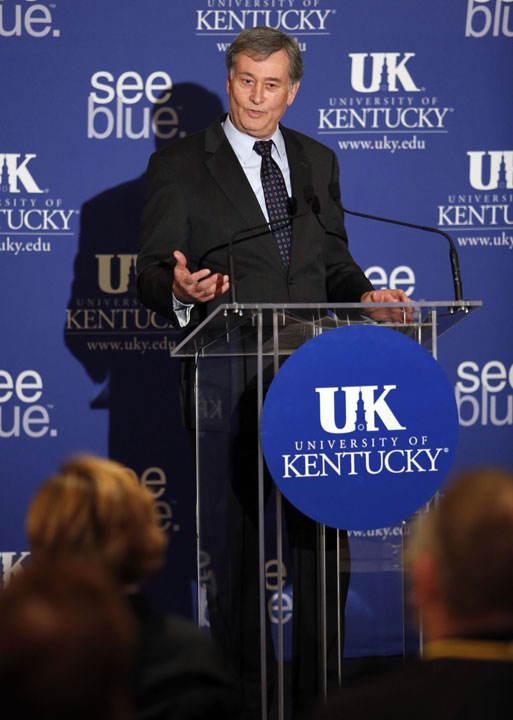
Gene Wilhoit talks about the Center for Innovation in Education. Wilhoit, a former Kentucky education commissioner, has been named director of the center. Photo by Amy Wallot, Feb. 8, 2013
The National Center for Innovation in Education is being established at the University of Kentucky College of Education with funding from two of the country’s leading foundations — the Bill & Melinda Gates Foundation and the William and Flora Hewlett Foundation.
The center will be directed by Gene Wilhoit, a former Kentucky Department of Education commissioner who is a highly regarded figure in national education circles. Wilhoit most recently spent six years as director of the Council of Chief State School Officers (CCSSO) in Washington D.C. During his tenure at CCSSO, Wilhoit spearheaded the development and adoption by 45 states of the Common Core State Standards.
The National Center for Innovation in Education will contribute to the national education reform agenda with a focus on ensuring more states are adopting and implementing a standard definition of college and career readiness that embodies “deeper learning” outcomes, implementing meaningful measures of those outcomes, and holding all levels of the system accountable for results.
“It is fitting that the National Center for Innovation in Education is being established in Kentucky, which has been at the forefront of adoption of the Common Core State Standards and promotion of college and career readiness and innovation in its schools,” said Kentucky Education Commissioner Terry Holliday. “The University of Kentucky and its P20 Innovation Lab are critical partners, providing Kentucky schools and educators with expertise and resources as they undertake this transformative work. The Kentucky Department of Education and I look forward to working with the new center, and with Gene Wilhoit, a nationally-recognized education leader who brings a long-standing commitment to improving education for all students as well as a deep knowledge of Kentucky education and its reform efforts.”
Deeper learning delivers the skills and knowledge students will need to succeed in a world that is changing at an unprecedented pace. Deeper learning prepares students to master core academic content, think critically and solve complex problems, work collaboratively and communicate effectively.
“The goal we have established for all of our children to be college and career ready is the right one for them and for our nation,” Wilhoit said. “However, I am convinced that the ‘schooling’ experience as it now exists in far too many places is out of alignment with the lofty goal we have set. We will reach our aspirations only when we cast aside historic perceptions and practices about how one acquires knowledge and skills.
As other countries are improving their education systems, too many American students are not being properly prepared in foundational subjects such as reading, writing, math, and science. Nor are we paying sufficient attention to cultivating the skills students will need to thrive in a globally connected job market.”
Most states have not yet been able to transform systems to close the equity gap and deliver high quality, deeper learning outcomes to every child, which is manifested through high variability in the quality of education and lower levels of educational attainment among U.S. students overall, and especially among those in poverty and students of color, Wilhoit said. This high degree of quality and variability in results is impacting the well being of individuals and communities and the country’s long-term economic success.
Under Wilhoit’s leadership, the work of the center will focus on:
- Supporting states as they implement Common Core State Standards.
- Working at the national and federal levels with key influencers and organizations to promote reforms that lead to deeper student learning.
- Facilitating relationships in states to place value on deeper learning outcomes within postsecondary education and workforce development programs.
- Providing assistance to leaders of the Innovation Lab Network so that they are more rapidly and effectively translating local innovations into policy.
- Facilitating dialogue with state policy makers to set conditions that support the reform efforts.
- Promoting the role of teachers as solutions designers and producers of new knowledge about how we cause learning.
In 2010, UK committed $1.5 million to launch the Kentucky P20 Innovation Lab, an initiative that is partnering UK College of Education faculty and national experts with Kentucky school leaders to create new systems to support 21st century learning. The Center for Innovation in Education will be housed at the UK Coldstream research campus. The center will work in close collaboration with other organizations, but will have its own executive team and funding structure.




Leave A Comment